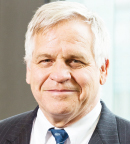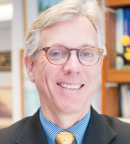
“I’m a firm believer that the proportion of patients benefiting from precision medicine is going to rise and that the treatments are going to become increasingly more effective.”— Bruce E. Johnson, MD, FASCO
Tweet this quote
Dedicating one’s career and livelihood to the pursuit of treating and possibly curing cancer is, for many, a decision that stems from deeply personal and, often, tragic experience. For 2017–2018 ASCO President Bruce E. Johnson, MD, FASCO, the event that greatly influenced his decision was the diagnosis of his aunt with metastatic breast cancer when she was in her late thirties. She had some nonspecific medical issues, and her doctors performed a bone marrow biopsy when they discovered hematologic abnormalities.
But Dr. Johnson didn’t find out about his aunt’s diagnosis from a phone call or a family member: during his oncology rotation, Dr. Johnson himself saw the cancer cells in her biopsy.
“At the time, there were effective treatments, but it certainly wasn’t what we have today,” he recounted. She died a little less than a year after her diagnosis.
More than 30 years later, Dr. Johnson, Chief Clinical Research Officer and Institute Physician at Dana-Farber Cancer Institute and Professor of Medicine at Harvard Medical School, has made it his life’s work to improve treatments for patients with cancer. Dr. Johnson currently directs the Dana-Farber/Harvard Cancer Center Lung Cancer Program, a cooperative effort that includes seven Harvard-affiliated schools and institutions. He is currently engaged in translational research in patients with adenocarcinoma of the lung. He also has a robust history of volunteer and committee service to ASCO, as well as other cancer research societies.
“I cannot think of anyone more qualified to be president of ASCO than Dr. Bruce Johnson,” said Immediate Past President Daniel F. Hayes, MD, FACP, FASCO. “He has been a leader in understanding the biology of lung cancer and has led groundbreaking trials to change the way it is treated. He will continue to carry the baton as ASCO helps its members adapt to the changing professional and financial aspects of oncology practice, ensuring that we take advantage of all of our resources, including CancerLinQ®, to do so.”
Early Mentorship
DR. JOHNSON ATTENDED medical school at the University of Minnesota, and did his first oncology rotation during his third year.
“I got to see what it was like to take care of patients with cancer and what it took for someone to be cured,” said Dr. Johnson. With that experience, he said, he was sure he wanted to be an oncologist. His aunt’s diagnosis only made him more certain of his path.
Throughout his medical training, Dr. Johnson worked with some of the leading oncology minds of the time. During medical school, he studied under mentor Clara D. Bloomfield, MD, FASCO, a renowned expert in the study of lymphoma and leukemia at the Masonic Cancer Center in Minnesota. He did his postgraduate training at the University of Chicago from 1979 to 1982, where he worked with Harvey M. Golomb, MD, FASCO, who would be elected ASCO President in 1990. During his fellowship at the National Cancer Institute (NCI), Dr. Johnson worked with Daniel C. Ihde, MD, on his first research abstract, which he presented at the ASCO Annual Meeting in 1985. His abstract, which focused on long-term survivors of small cell lung cancer, was selected as one of the top abstracts for the entire meeting, which opened up an exciting opportunity: he was invited to the European Society for Medical Oncology in Nice, France.
“In my last fellowship year, my first year of faculty, I was able to travel internationally,” said Dr. Johnson. “I really enjoyed the scientific energy, even from those early days, and it only grew over the years.”
Dr. Johnson’s passion for the science and rapid nature of cancer research spurred him to look for ways that he could contribute more to the field. Thanks to the help of his mentor, Dr. Bloomfield, he didn’t have to look for long.
Dr. Bloomfield introduced him to the ASCO Scientific Program Committee in 1988, while she was serving as its Chair, which led to a long record of ASCO volunteer service. Over the course of his membership, Dr. Johnson has served as Chair for five different committees and been a member on numerous others. He cites his work on the Cancer Education and Scientific Program Committees as some of the most enjoyable experiences with the Society.
“The Scientific Program Committee is the leading venue for the latest scientific findings in cancer,” said Dr. Johnson. “The reason I went into the field was that I thought the treatments weren’t good enough yet, and I always wanted to be at a research institution where we take the existing treatments and make them better.”
Having been an ASCO member for over 30 years, Dr. Johnson recounted the dramatic changes the Society has undergone since he joined. One constant, he noted, is the dedication of its mission-driven staff.
“The staff is very professional and supportive of the needs of the Society, and most of us continue to be inspired by how hard they work and their commitment to ASCO’s mission,” he said. “The thing that inspires me about being an ASCO member and participating in the organization is being able to interact with the staff. It’s consistent throughout, and it allows you to see excellence in our organization.”
An Emphasis on Precision Medicine
FOR THE THEME that will guide his presidential term, Dr. Johnson selected “Delivering Discoveries: Expanding the Reach of Precision Medicine,” which highlights the importance of making precision medicine accessible to every patient with cancer. His plan involves providing clinical decision support to providers, as well as developing easier ways for them to stay abreast of genomic information so that they can better target therapies and treatments for their patients.
“Precision medicine has transformed care for subsets of our patients in the academic setting,” said Dr. Johnson. “I’m a firm believer that the proportion of patients benefiting from precision going to become increasingly more effective.”
However, his optimism at the prospect of universal precision medicine is marginally tempered by the current realities of clinical care. As an oncologist who works directly with patients, he finds the lack of information about the efficacy of ongoing trials concerning, as well as the relatively inaccessible nature of reports containing extensive genomic and phenotypic characterizations. He noted that while the intricacies of precision medicine may be better understood by academics, it is crucial to make such information accessible to doctors who need it to make treatment decisions for their patients.
The key, he believes, is improving the delivery and reach of cutting-edge research. In the strategic plan for executing his presidential priorities, Dr. Johnson identified harnessing big data and health information technology (including ASCO’s own platform, CancerLinQ), promoting the global exchange of information and resources, and designing more innovative clinical trials as being critical to the success of his mission.

“Dr. Johnson has been a strong and consistent proponent of incorporating real-world data to complement prospective clinical trial results for guiding patient care.”— Daniel F. Hayes, MD, FACP, FASCO
Tweet this quote
“Dr. Johnson has been a strong and consistent proponent of incorporating real-world data to complement prospective clinical trial results for guiding patient care,” Dr. Hayes said.
“We want to continue offering educational programs through traditional means like meetings, but also electronically, to be able to update our practitioners on genomic information in ways that they can both understand as well as access,” said Dr. Johnson, who also expressed a desire to make information and educational materials accessible to clinical oncologists in real time while seeing patients.
Building on a Bedrock of Success
DR. JOHNSON’S theme focuses on the future of personalized care, but he insisted that he is merely building on the work that ASCO is already doing in these areas.
“I tried to be very careful in picking a topic where there were already efforts going on within ASCO and that fit with the broader mission,” he said. “We want to listen to what our members want from the organization. This is a long-term, multiyear effort, and it’s a pleasure to work with [former ASCO Presidents] Julie Vose and Dan Hayes, who, during their own terms, took on multiyear tasks.”
As he takes steps during his presidency to advance precision medicine, Dr. Johnson hopes to lay groundwork on which ASCO can continue to build in the future. “My goal in continuing to expand the reach of precision medicine is to do it not only this year, but work with President-Elect Monica M. Bertagnolli, MD, and her successor, to continue these efforts beyond the term of my presidency, as long as it’s compatible with their goals and the resources are available,” he said. ■
Originally published in ASCO Connection. © American Society of Clinical Oncology. “ASCO President Dr. Bruce E. Johnson Seeks to Bring Personalized Medicine, Real-Time Data Into Every Oncology Practice.” ASCO Connection, July 2017. All rights reserved.

